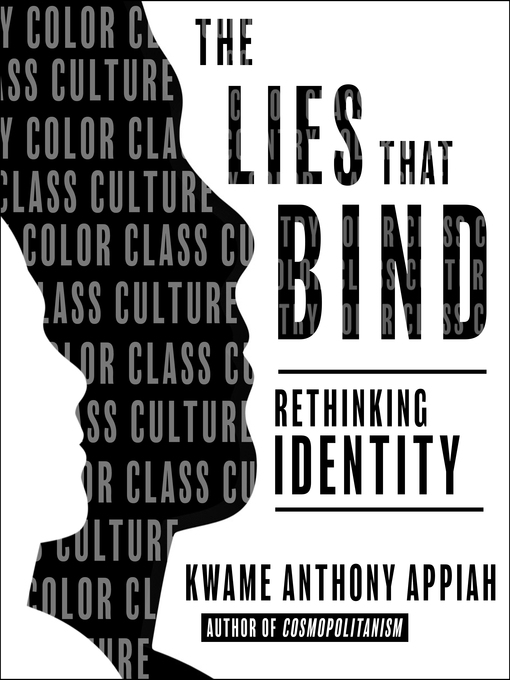-
Creators
-
Publisher
-
Release date
August 28, 2018 -
Formats
-
OverDrive Listen audiobook
- ISBN: 9781684413577
- File size: 210327 KB
- Duration: 07:18:10
-
-
Languages
- English
-
Reviews
-
AudioFile Magazine
Who are you? It's a simple question, and most people will answer it with a reference to race, gender, religion, and/or culture. It's also the question that launches this thoughtful, fascinating, remarkable audiobook. The author narrates his own work and does a terrific job. His reassuring, playful voice, tinged with a British accent, is immediately friendly and knowledgeable. Appiah reads comfortably and brightly, leading us through a journey that begins to address the questions he raises about how we see ourselves. He also paces himself so we can follow his lively story. There are times when he loses momentum at the ends of sentences, but, overall, Appiah can count himself a double-threat. R.I.G. © AudioFile 2018, Portland, Maine -
Publisher's Weekly
June 18, 2018
The supposedly eternal categories people use to group themselves into antagonistic collectives are misleading memes of recent vintage, according to this probing critique of identity politics. New York University philosophy professor Appiah (Cosmopolitanisms) argues that, although people have an innate “clannishness”—an instinct to identify with groups—the common essential properties that bind those groups are arbitrary, inconsistent, and mainly imaginary. The idea of fixed biological races, he contends, developed in the 18th century to justify the transatlantic slave trade; the notion of homogeneous national identities sprouted from a 19th-century romantic philosophy that forced them onto multiethnic, multilingual communities; modern religious divisions are based on contradictory, often unintelligible scriptures; and, contrary to the dicta of both white nationalists and Afrocentrists, Western culture isn’t the creation of Europeans, Egyptians, or any other single people. Writing in erudite but engaging prose, Appiah spotlights figures who created identitarian doctrines or challenged them, including a West African boy who traveled to Germany in 1707 and became a philosophy professor, and ponders his own complicated identity as a gay, biracial man descended from English knights on his mother’s side and Ghanaian royalty on his father’s. With deep learning and incisive reasoning, Appiah makes a forceful argument for building identity from individual aspirations rather than exclusionary dogmas.
-
Loading
Why is availability limited?
×Availability can change throughout the month based on the library's budget. You can still place a hold on the title, and your hold will be automatically filled as soon as the title is available again.
The Kindle Book format for this title is not supported on:
×Read-along ebook
×The OverDrive Read format of this ebook has professional narration that plays while you read in your browser. Learn more here.


